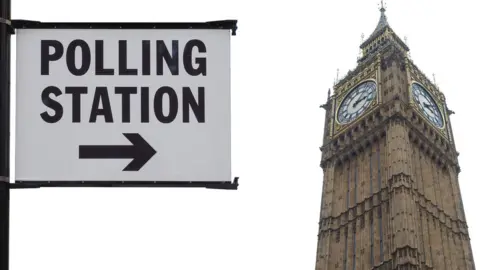New Elections Bill to 'protect democracy,' says government
 Getty Images
Getty ImagesControversial plans to require voters to show photo ID at polling stations have been introduced in Parliament.
Ministers say new safeguards on proxy and postal voting will "protect democracy".
The measures will increase "transparency, fairness and accountability," said the constitution minister, Chloe Smith.
But Labour says the plans amount to "vote rigging" and would lock millions of people out of democracy.
It says the Conservatives are engaging in "blatant voter suppression" and wasting millions of pounds of taxpayers' money on "dirty election tactics".
'Trumpian tactics'
The bill will ban party campaigners from handling postal votes, "put a stop to postal vote harvesting and make it an offence for a person to attempt to find out or reveal who an absent voter has chosen to vote for," the Cabinet Office said.
Postal vote harvesting occurs when one person collects and hands in ballot papers from multiple different people.
It said the requirement to show an "approved form of photographic identification" before collecting ballot papers would "strengthen the security of the voting process" and bring the rest of the UK into line with Northern Ireland.
Anyone who does not have one of a "broad range" of valid documents would be able to get a "Voter Card" from their local authority, for free, it added.
But Labour described the measure as "a Trumpian tactic" which "has no place in our democracy."
Disparities between groups
Labour's shadow minister for democracy, Cat Smith, said: "Voter ID is a total waste of taxpayers' money, set to cost millions of pounds at every election".
"Voting is safe and secure in Britain. Ministers should be promoting confidence in our elections instead of spreading baseless scare stories which threaten our democracy."
She added that ministers were changing the rules to "rig our democracy".
"First it was using the cover of the pandemic to hand out taxpayers' money to their mates, now it's using the cover of the pandemic to threaten British democracy. These plans must be stopped."
She said the plans would make it harder for working class, older and Black, Asian and minority ethnic Britons to vote.
Data from a Cabinet Office survey from March shows that 91% of those polled had a form of ID which was in date and recognisable. It found that 99% of 18 to 24-year-olds held photo ID, while the figure was 91% for those over 85.
It also found that "individuals from the white group were less likely to hold any form of photo ID than those in an ethnic minority group," but the difference was very small (98% vs. 99%).
Other measures
According to the Cabinet Office, the bill also aims to "maintain public confidence in the democratic debate," by protecting candidates and campaigners from intimidation and abuse, while requiring more transparency from campaigners about who they are working for.
And a new measure will be brought in to ensure "that only UK based - or otherwise eligible sources with a genuine and legitimate interest in our elections - can spend money campaigning in our elections," the Cabinet Office said.
Other plans would remove the 15 year limit on overseas electors voting in UK general elections, and relax restrictions on who can act as a companion to a disabled voter at a polling station.
Local returning officers, who oversee elections, would be required to provide support for a wider range of disabilities or needs.
The Electoral Commission, which regulates political parties and implements electoral law, said the bill "represents a strong commitment from the UK government to modernising our electoral system and addressing areas that need improvement."
Craig Westwood, the commission's director of communication, policy and research, said electoral laws were "already complex and fragmented, so introducing new requirements can add additional risk."
"Changes will need to be well planned, with implementation phased and properly funded, to ensure that electoral administrators, and others involved in running elections, can deliver the changes as intended," he added.
